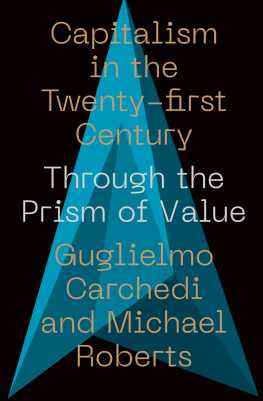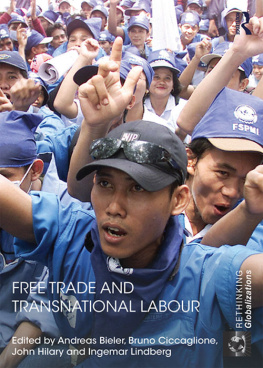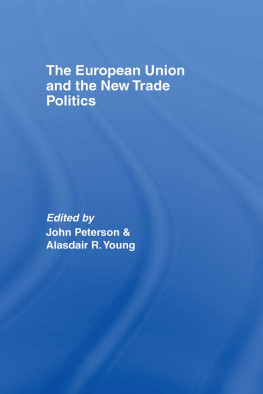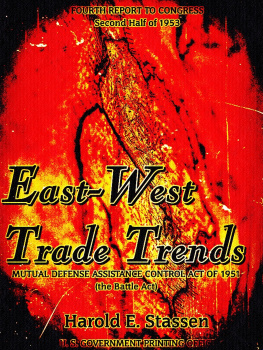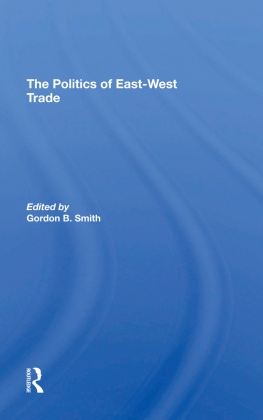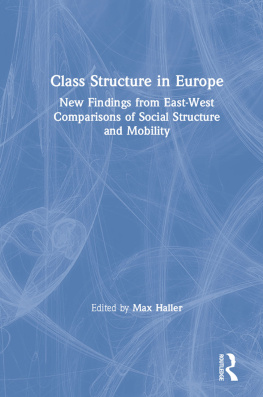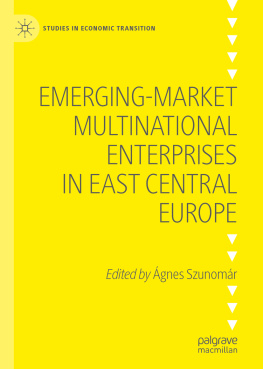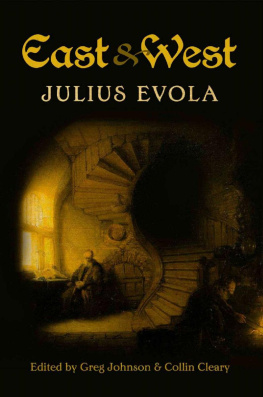Trade Union Activists, East and West
First published 2000 by Gower Publishing
Reissued 2018 by Routledge
2 Park Square, Milton Park, Abingdon, Oxon OX14 4RN
711 Third Avenue, New York, NY 10017, USA
Routledge is an imprint of the Taylor & Francis Group, an informa business
Copyright Guglielmo Meardi 2000
All rights reserved. No part of this book may be reprinted or reproduced or utilised in any form or by any electronic, mechanical, or other means, now known or hereafter invented, including photocopying and recording, or in any information storage or retrieval system, without permission in writing from the publishers.
Notice:
Product or corporate names may be trademarks or registered trademarks, and are used only for identification and explanation without intent to infringe.
Publishers Note
The publisher has gone to great lengths to ensure the quality of this reprint but points out that some imperfections in the original copies may be apparent.
Disclaimer
The publisher has made every effort to trace copyright holders and welcomes correspondence from those they have been unable to contact.
A Library of Congress record exists under LC control number: 00134484
ISBN 13: 978-1-138-73653-5 (hbk)
ISBN 13: 978-1-315-18589-7 (ebk)
I cannot start the acknowledgements with anyone but the co-authors of this book: the many union officers, activists, members, as well as ordinary workers who helped me and took part in formal and informal conversations. While having much more important business of their own, they gave me lots of their time and very often their contributions impressed me with their high sociological quality. Not only this, they often received me with friendship and real hospitality. Whether drinking an espresso or a Zywiec, whether savouring a golonka po bawarsku in Silesia or some spaghetti alia carbonara in Tuscany, the moments of informal socialisation with the living body of the unions have remained the best experiences of the research project.
The industrial workers were not, however, the only people I exploited. This book originates in my doctoral dissertation, and I am indebted for their invaluable help to my three instructors: Bianca Beccalli, Michel Wieviorka and Colin Crouch who at different stages and with different styles looked after me. They all gave their careful and precious criticism without reservation.
I worked on this book across four countries, five high schools and a dozen plants. I have not maintained a database of the people who helped me but I would like to acknowledge at least Olivier Cousin, Richard Hyman, David Ost, Marta Petrusewicz, Marino Regini, Vittorio Rieser, Philippe Schmitter and Alain Touraine. Several people have straggled with my macaronic English in order to make it readable: Nicki Hargreaves, Nicky Owtram, Conor Cradden and Gerard Sharpling are the heroes.
The most decisive help was received, however, in Poland. Marcin Frybes treated me as a Pole, a honour I did not expect to ever receive. Grazyna Ulicka and Mirosiawa Grabowska took care of me as opiekunki (protectors) during my stages at the University of Warsaw in 1996 and 1998. Wieslawa Kozek and Jolanta Kulpinska kindly invited me to the Congress of the Polish Sociological Association in 1997, as well as to various seminars. I also received useful suggestions from Juliusz Gardawski, Leszek Gilejko, Kazimierz Kloc, Ireneusz Krzemiski, Pawe Kuczyski, Piotr Marciniak and Wodek Pakw.
| AFP | Piombino Steelworks |
| AWS | Solidarity Electoral Action |
| CFDT | French Democratic Labour Confederation |
| CGIL | General Italian Confederation of Labour |
| CGT | General Labour Confederation |
| CISAL | Italian Confederation of Autonomous Workers Unions |
| CISL | Italian Confederation of Worker Unions |
| CISNAL | Italian Confederation of National Labour Unions (linked to the MSI) |
| Cobas | Basis Committees |
| CRZZ | Central Trade Union Council (official unions until 1981) |
| DS | Left Democrats (mutation of the PDS in 1998) |
| EMF | European Metalworkers Federation |
| ETUC | European Trade Union Confederation |
| EWC | European Work Council |
| FAT | Food and Tobacco Federation (associated to the CISL) |
| FM | Italian Federation of Metalworkers (associated to the CISL) |
| FIOM | Federation of Manual and Clerical Metalworkers (associated to the CGIL) |
| FLAI | Agroindustry Federation (associated to the CGIL) |
| FLM | Metalworkers Federation (unitary federation of FIOM, FIM, UILM from 1972 to 1984) |
| FSM | Low-powered Car Factory |
| FSO | Warsaw Car Factory |
| KPN | Confederation of Independent Poland (nationalist party) |
| KPP | Confederation of the Polish Employers |
| MNC | Multinational company |
| MSI | Italian Social Movement (neo-fascist party) |
| NSZZ | Independent Autonomous Trade Union |
| OPZZ | All-Polish Coalition of Trade Unions (official unions since 1982) |
| PCI | Italian Communist Party |
| PDS | Democratic Party of the Left (heir of the PCI) |
| PZPR | Polish United Worker Party (Communist) |
| RLS | Workers Representatives for Safety |
| ROP | Movement for the Reconstruction of Poland |
| RSU | United Trade Union Representatives |
| Sida | Automotive Union (Fiat company union) |
| Sin-Cobas | Inter-Industry Trade Union of the Rank and File Committees |
| SLAI | Inter-Industry Trade Union of Self-organised Workers |
| SLD | Alliance of the Democratic Left (mutation of the PZPR) |
| UGL | General Labour Union (mutation of the CISNAL) |
| UIL | Italian Labour Union |
| UILM | Italian Union of Metalworkers (associated to the UIL) |
| UP | Labour Union |
| UW | Freedom Union |
Some months after the fall of communism, I had one of my first (at that time still accidental and with the help of a language mediator) conversations with Polish workers. At a certain point one of my interlocutors incidentally said: You are in a different situation, youre a capitalist. What I knew about class consciousness from Marxist readings and sociology textbooks, which I already knew to be barely adequate for the analysis of the Italian situation, was challenged by the involuntary offensiveness of an incidental sentence.
When looking at Polish workers (and later, at Czechs, Slovaks, East Germans, Hungarians, Albanians and Yugoslavs) I was continually surprised by a number of similarities, especially in practical situations, with their Western counterparts, and yet at the same time by their difference from them. This was most striking in the case of the trade unions, traditionally the spokespersons (although not necessarily representative) of the working class. I started to wonder whether union activists from the East and the West managed to communicate. From this curiosity stemmed the research project on which this book is based.


